May 27, 2023
Kunal Chandiramani
Kunal Chandiramani is the Chairman of KStar Holdings – operating businesses in EdTech, Mental Health, and SaaS with physical presence in 8 countries. He is also the Founder of dToks – a globally renowned podcast featuring billionaires and NYT best-selling authors, helping people rejuvenate and detox. Kunal is a 3x TEDx speaker, 35U35 with a successful eCommerce exit.
One Line Life Lessons from Kunal
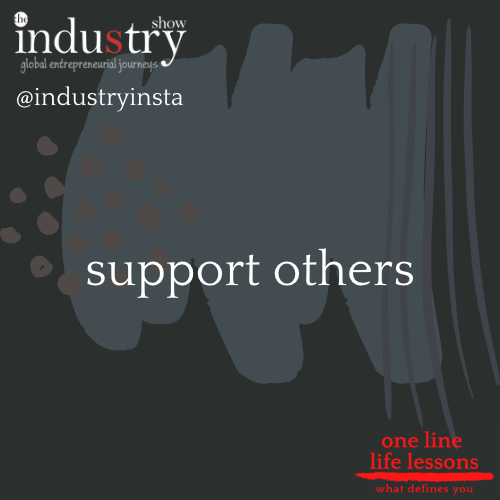
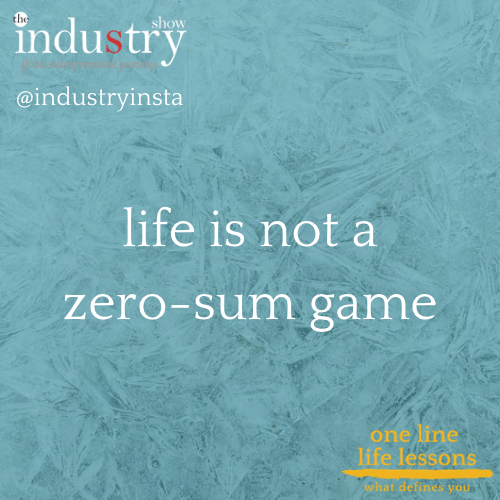
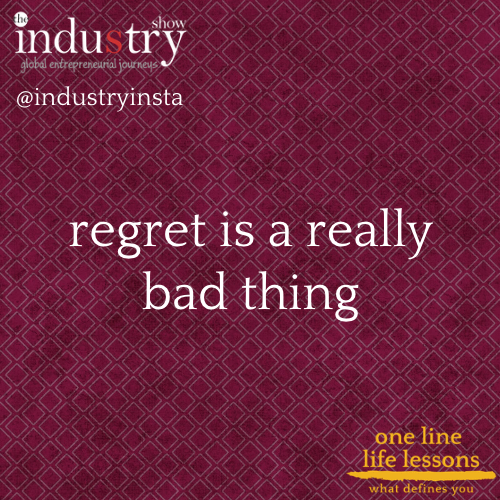
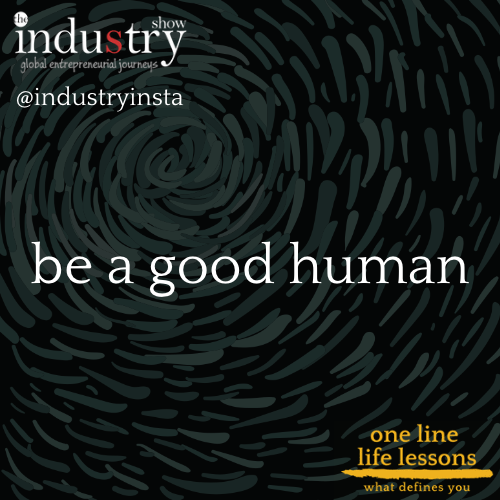
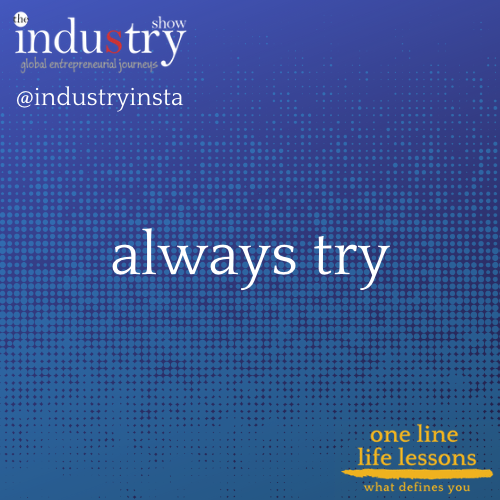
Episode Highlights
- (0:00:00) – Nitin Bajaj welcomes Kunal Chandiramani to the show
- (0:00:14) – Kunal is someone who very curious about every single thing
- (0:00:57) – What do you do for a living, in your own words
- (0:02:57) – Give me a sense of the size and scale of either the impact or operations
- (0:04:53) – Tell me the why behind every story, every journey has a why
- (0:06:36) – Tell me, what’s the one big challenge you’re facing right now
- (0:08:01) – What’s the most exciting opportunity for you right now in business
- (0:10:23) – An experience that did not work out as you expected becomes a lesson
- (0:16:31) – Be a good human. It comes down to as simple as that. I think the best and most successful people are good humans
- (0:19:01) – Moving to number five. Life is not a zero sum game. Most times it’s far from it
Show Transcript
Transcript - Full Episode
Nitin Bajaj: (0:00:00) – Hey, everyone, welcome to the industry show. I’m your host, Nitin Bajaj. And joining me today is Kunal Chandiramani. Kunal, welcome on the show.
Kunal Chandiramani: (0:00:09) – Thank you so much. Happy to be here.
Nitin Bajaj: (0:00:12) – Great to have you here.
Kunal Chandiramani: (0:00:13) – My pleasure.
Nitin Bajaj: (0:00:14) – Let’s start with who is Kunal?
Kunal Chandiramani: (0:00:16) – I was trading this question. Let’s see. Kunal is me. Someone who very curious about every single thing. Even when it doesn’t suit to be curious, just curious by default. I think that the default setting is curious and the moment you move it, the dial any other side, it just comes back. I think that practically defines me. Just super curious about literally everything. And that’s practically what my entire journey has been. Curiosity to curiosity.
Nitin Bajaj: (0:00:49) – I love it. That’s a good north star to have and keep chasing. So stay that way. Now, I know you’ve done a few things already, and I typically like to ask people what are they working on right now? But I’m more curious to know, what do you do for a living, in your own words?
Kunal Chandiramani: (0:01:11) – It’s funny to think, I think beyond the point we stop doing things per se, a living, but start doing them to live.
Nitin Bajaj: (0:01:19) – Yes.
Kunal Chandiramani: (0:01:20) – Just because I like to think that way, because I think work needs to be like, it’s a huge part of our life. And not just because from one perspective, but just because it is our opportunity to really get something out in the world, which is entrepreneurship. Just getting something a tiny bit or a little larger, maybe a 0.1% difference in our community, in the place we live in the country we live in, adding that to the world. So I feel that per se, that is something to live for. So let’s see. I built a couple of businesses. I’ve been extremely fortunate a lot of times. Right place, right time. And as my team points out, every single time. Right place, right time and right team. I think that’s super important. I think when you look through straight, it’s just the founder that comes up. But then it’s this whole, I think especially say beyond the first 510 months, the whole scenario of how much a founder does changes, I think so. I think I built KSTA ecommerce. That was the largest business I built.org, kStA. Once we exited majority of the sets, we kept up the name in turn and made that Keistar holdings and the set sold became Keisha e commerce. It was incredibly fun. We did something very high impact. I think that’s what makes me so proud. Done a couple cool things. Cool from my perspective. And it’s been fun. It’s been a lot of fun.
Nitin Bajaj: (0:02:57) – That’s great. Give me a sense of the size and scale of either the impact or the operations. Right. So Kstart became pretty decent size. Walk us through some of the numbers.
Kunal Chandiramani: (0:03:12) – So we worked with over 100,000 users. When Keishta, we worked with pretty big numbers. We worked with some very aspirational sellers. And that was the best part. I think that’s what excites me about anything I built for India and even the future, with India being such a key, so close to my heart and so close to my brain, when I think about building something just the size of the podsity. But I think we talk so much when we talk about India, about the size of the pot. What we saw at case that when we work with so many people was the size of the aspirations. Everyone wants to be an entrepreneur.
Nitin Bajaj: (0:03:51) – There was a fire burning very bright.
Kunal Chandiramani: (0:03:55) – And I think that’s exciting. So even though we say the beauty is, when you work with ten people in India, the word of mouth is absolutely crazy, because it’s often. I don’t think India is one of the funny things, is it’s not just word of mouth. I think there’s this old saying about neighbors peeking into everyone’s houses. So beyond word of mouth, it’s neighbors eyes that help you out. Sometimes it’s just the viral effect in India is beautiful, especially when you’re helping someone do something. Just. It spreads. It worked well for us, but I think it’s been fun. We got some really good numbers. 100,000 users. Detox, the podcast detox is another business I built in the mental health sector. That was amazing because we host a podcast under that where I’ve got to interview people who, five years back, I wouldn’t fandom talking to at 19. So it’s been crazy.
Nitin Bajaj: (0:04:52) – It’s amazing. Tell me the why behind every story, every journey has a why. And I’m really interested to hear yours.
Kunal Chandiramani: (0:05:04) – I have a really good answer for that one. The why was finding whys. It’s honestly if I put down. So my first TED talk was called the 14 year olds question. And I think that question has literally been the underlying thing through most of my life. I remember it always not being a good thing because indian schools aren’t very able to answer, abled or enabled or just have the infrastructure or the want to take up questions and to delve into curiosity, in fact, why specific to India, just generally schools. And so for a long time, I was very fortunate at home that curiosity was a good thing. But outside of that, it was always seen as disrupting the environment, as spoiling everyone’s speed by asking why do you want to go at that speed? It’s absolutely crazy. It’s basically the convention comes down to. In most school systems, if you’re walking towards extinction, the worst thing to do is ask why? And waste time and slow everyone down. Basically, you really need to. I think that personal audit is so important, but beyond that, I think everywhere you just need to ask a why. So my why was just asking why.
Nitin Bajaj: (0:06:29) – I love that. It kind of circles back to the curiosity meter. That’s really very relevant. Tell me, what’s the one big challenge you’re facing right now?
Kunal Chandiramani: (0:06:46) – Just a quick add to the previous question. A second why would be impact for me, creating impact, helping people, seeing that smile spread and come back to you, it’s heartwarming. I’ve never felt. It’s amazing. So the one challenge, I don’t know, it’s funny. I’ve been trying things together. I’ve always multitasked. And I got so used to multitasking that when I started focusing, multitasking in more terms and roles because I don’t know, it sounds funny, but being 1415 1617 has different kinds of obligations than any other age.
Nitin Bajaj: (0:07:23) – True.
Kunal Chandiramani: (0:07:25) – Definitely much more fortunate because you don’t have a lot of the obligations that you do have at a much later age, but then you have its own sets. It was funny. I was trying to balance a lot of things, so it’s always been that way. And I think often when I talk it comes out by now. I found a way to deal with handling so many roles at one time and still not losing something. But I think that’s still a challenge and I don’t think it won’t be just because it is supposed to be a challenge.
Nitin Bajaj: (0:07:58) – Right, true. On the flip side, what’s the most exciting opportunity?
Kunal Chandiramani: (0:08:08) – The most exciting opportunity personally, right.
Nitin Bajaj: (0:08:12) – Could be personal, could be professional. If you look at there’s obviously a lot, especially given your exposure and access to things. But what’s the one that is the most exciting for you?
Kunal Chandiramani: (0:08:27) – It is funny to narrow it down to one because especially right now, in all my years in business, and I think this is the first time I’ve been at a phase where I’ve taken a step back to really do self explanation, which I think is a privilege. Most people don’t get the opportunity to do it. Forget at 19, but it’s getting the opportunity to really do that. I think the greatest opportunity generally, I feel community is an incredibly powerful thing. There’s a couple of things I’m looking into on the community angle that we’ve spoken about, but building really strong communities of like minded people, we’ve got to do that with detox. For mental health, we built the detox’s nonprofit angle, which worked with over 1000 interns, which was an incredible number because for the first time, I felt I had a team of thousand people. It was a good feeling, but it was also classic Spiderman. With great power comes great responsibility. Just realizing that there were so many people, depending, I think a big challenge and a big opportunity right now is mental health. We’ve been looking at it with detox more passively and actively, but more passively now to find something that we really feel we want to go deeper into outside of what we’re already doing actively. Mental health and community, these are two things that they are off the top of my head, I’ve been obsessed about more than most things 19 year olds are obsessed about.
Nitin Bajaj: (0:10:02) – And I think that’s very speaking of the environment we are in today. We went from not talking about this at all to starting to accept and address that this is a problem in the community. So I’m glad you and several others are working in this space. It’s much needed. Now, let’s look back in the rear view mirror and talk about two things. One, an experience that did not work out as you had expected was a failure, became a lesson. And on the other side, and you may have hinted at this in some of the previous answers, an example of something that blew your own expectations and became a success beyond your imagination.
Kunal Chandiramani: (0:10:52) – So I’m going to start with the second one. The thing with the second one is I can think of so many. But just because we’re talking about detox, I think it’s crazy. When you throw enough shots, you throw enough balls, and just to expect one or two to hit. When you throw one or two balls, there’s a high chance none of them are going to hit. But when you throw 20, expecting one to hit, you’ll be surprised four or five of them really hit the basket, but say went beyond hitting the basket. I don’t know how I can build that into this analogy, but aim for the mood. Sometimes you end up amongst the stars. Even better. But I’m thinking about this. Detox was amazing that way, because the nonprofit under detox, we tried it under. We did it under a very small experiment just to see how we could be of help to a small group of individuals. Turns out we were able to develop a framework that was very scalable. And this was completely nonprofit funding. It just because we realized that, I think we all have a responsibility to do something that improves society, improves our community, and then beyond that, or tries to improve mankind as a whole, even if it’s by 1000 of a percent, it’s still a huge impact. But in this case, we were able to work with young people, people all the way from, say, grade eleven, all the way to, say someone pursuing their master’s phd from universities such as the University of Pennsylvania, like really high end schools and universities in third world countries, which I had never heard of. Like get people, get them together in cohorts of 2025 people, take them through a program, train them on psychological first aid. Very simple, non medical, not very deep, but more broad. So basically, I think we talk a lot about first aid. We talk a lot about knowing CPR too. But even beyond that, everyone knows how to put a bandage. When you talk about mental health, not too many people know about someone’s having a break, you might actually go. And especially the way we think we might just go and end up causing them pushing them beyond the cliff rather than giving them a hand. So we just train them on basic psychological first aid so they can just be of help.
Nitin Bajaj: (0:13:25) – If someone needs help, at least recognize it, and then provide some basic help. The equivalent of putting a band aid on someone.
Kunal Chandiramani: (0:13:31) – Exactly. I think we have a huge obsession with big rolling, big changes. Someone who’s like, I think what we forget is it’s preventive care. We always focus. If something’s minus ten right now, we’ll wait for it to get -100 -150 before we intervene. But when it’s at minus ten, it’s so much easier to intervene. And you can do so much, so many more people. You can grow the impact so much. So that’s what we did, aimed at larger people. For the second part of the. Wait, what was the first part of the question again?
Nitin Bajaj: (0:14:05) – The first one was something that did not work out as you’d expected.
Kunal Chandiramani: (0:14:08) – That’s so many things. I don’t know. I want to say school, but that’s funny, guys. So I home schooled for my 11th and twelveth just because I realized I was getting awfully bored in school. It was comical. I was realizing, I don’t know. I think so many schools still do not allow students to bring a phone or a laptop to school, which is alien to me. Just thinking about, we’re in a world where artificial intelligence is growing at a pace which none of us phantom. And now we’re asking people to not get something to take notes on paper rather than a word processor and were expecting to prepare them for the world to come. There’s a lot of. Yeah, it is. Honestly, it is so comical to me just thinking how much schools aim for the future. But do not, don’t want to turn this into a land about school. But school definitely didn’t. I don’t think it was the perfect thing for me. So I decided I want to find a mix. I don’t want to completely steer away because it has its pros, as limited as they are, but it does have its pros. So I wanted to find a way I can develop to educate my own self. I can design so very personal, I don’t think I even have the right word. But I can basically decide what I want to teach myself and how I want to teach myself and the why. I want to teach myself what I feel would be of help to me and then take actions where I can learn that I home school to eleven and twelve after feeling that I completely failed out of the school system because it just didn’t fit. I didn’t per se fail out of it, but I just took a step back because I realized that I felt I was failing to teach me. Even if I got a really good grade, it didn’t mean I learned what I was supposed to learn. So I felt it failed me on the part or I failed it at learning anything effective. I was just getting grades. I don’t think that made a difference.
Nitin Bajaj: (0:16:19) – But like learning, I think you have the right objective in mind. As long as we are learning, the grades don’t really matter. They’re just a validation of something. But if you’re learning, then that is just a derivative. Anyways, so let’s transition into my favorite part of the show. We call it the one line life lessons. Would love for you to share your one liners with us.
Kunal Chandiramani: (0:16:45) – Yeah. Be a good human. I think it’s underrated by a huge quantum. I think we talk so much about what business is and what business isn’t and what life is, what life isn’t, you need to look for. I think the best and the most successful people I’ve met are really good humans. They really care. They genuinely care for the people who are around them. They care for everyone. So I think a lot of it comes down to just be a good human, care for everyone and don’t do anything that’s bad. It comes down to as simple as that. Just be a good human. It’s simple. Most times you can and you can’t. And sometimes there are gray areas, but I think you can. Most times you can find a way out of the gray areas into something that’s more white than black. Because everything’s not white and black, but you can try for more white than black. And whenever you can just be good, I just jump to the second one, right? Yeah, always try. I think again, very underrated. I think so many times we’re just better off if we try stuff. I think we just think to ourselves that it’s not going to work out before we’ve been given it a shot. Most times it’s worth a try. Just because regret is a very bad thing, it is the only thing I think I tend to steer really away from. This would probably be the third one. Regret is a really bad thing. So just try. Always try. I don’t think it can be overstated how important it is to try things that you’re obsessed with. Whether it’s like taking a leap of faith sometimes, trying something, trying out a new project, trying out a small idea, never know how big it grows. But if you don’t try, it’s just going to always stay with you. So it’s going to stay that you could have done it and that hurts. I’ve seen so many people always see so much pain when they’re talking about that, oh, maybe I could have made that work. And they’re like, so just try number three. Number four. Moving to number five. Life is not a zero sum game. This is by far my favorite one. Life is not a zero sum game. You become so wired as kids to think that there’s only this much that we all need to divide amongst ourselves. And it’s crazy to think about how little that has to do with reality. Most times it’s far from it. We can. Synergies and collaborations are so powerful at making one plus 111. It’s absolutely crazy. I think life is never a zero sum game unless you’re the last people looking for the last bunch of food. I think there’s always chances. Even then you can find a way to farm. Life is not as you sum game work like you can grow out of it, you can just work towards increasing it. You don’t need someone else. And I think last would be support others. I think we all expect everyone to support us, but we don’t expect to support others the same way, which is sad. I’ve been so fortunate with so many people who’ve supported me more than I could ever ask for, who’ve been there for me more than I would ever expect anyone to be there. And people who had no incentive for themselves to be there. It’s very important to give because always support others. And beyond supporting others, always give. I think that’s the best way to phrase it. Always give.
Nitin Bajaj: (0:20:42) – Help people love it. And thanks for giving your knowledge and experience that you have gained. So Bhat, really appreciate you coming on the show. It’s been a pleasure. I’m sure we’ll have you back again as you have more adventures, more experiences and more exits. But had a wonderful time as always.
Kunal Chandiramani: (0:21:03) – Likewise.
Nitin Bajaj: (0:21:05) – Awesome. Thanks.
Kunal Chandiramani: (0:21:06) – My pleasure.



